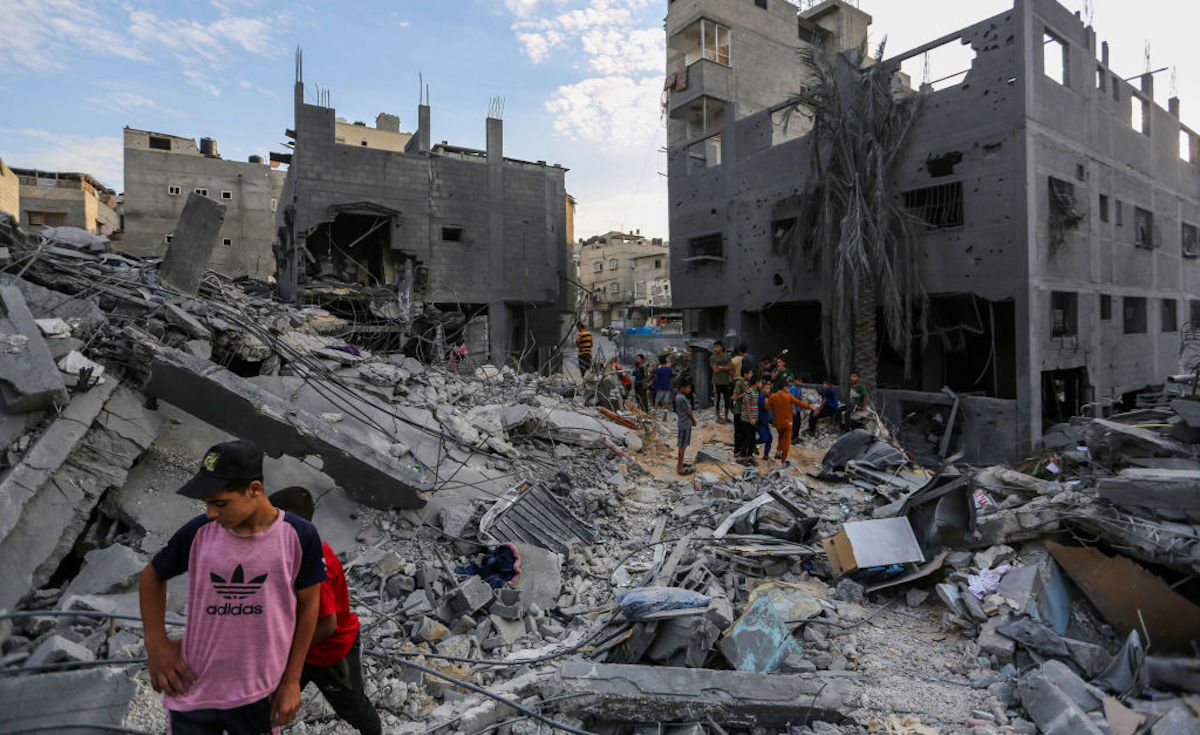There’s No Such Thing as a ‘Humanitarian’ Expulsion From Gaza

Israel’s plans to ethnically cleanse Gaza are becoming clearer by the day—and members of Prime Minister Benjamin Netanyahu’s administration are passing it off as humanitarianism.
Since Israel’s siege of Gaza began in October, after the militant group Hamas’s massacre of 1,200 Israelis, most of Gaza’s 2.2 million residents have been left homeless. Gaza City, once the largest city in the Gaza Strip, has been destroyed by airstrikes. The Gaza death toll has now surpassed 22,000 people, the vast majority of them civilians. As Gazans like journalist Bisan Owda have pointed out in their coverage of the siege, Gazans have no safe places left to go, with Israel attacking sites it previously told Gazans to evacuate to. Hunger, cold, dehydration, and disease are reportedly running rampant.
From this vantage point, Israel’s plans for Gaza couldn’t be more obvious. Israel seized Gaza from Egypt during the Six-Day War in 1967 and began a period of military control, in one form or another, that continues today. Many of Gaza’s residents in 1967 were refugees from the creation of Israel in 1948, also known as the Nakba, which expelled roughly 700,000 Palestinians from their homes. By bombing the strip to oblivion, indiscriminately killing civilians, and depriving survivors of basic necessities for life, Israel is continuing its mission of ethnically cleansing Gaza.
In fact, Israeli officials aren’t bothering to hide that goal anymore. Instead, they’re passing it off as a humanitarian effort aimed at supposedly saving Gazans from Hamas.
In November, two Israeli lawmakers, Danny Danon and Ram Ben-Barak, co-authored an op-ed in the Wall Street Journal calling on the international community to “accept limited numbers of Gazan families who have expressed a desire to relocate.” On its face, the call sounds reasonable. After all, the U.S. and other countries have accepted refugees from other war-torn countries, like Syria. However, it ignores the obvious context of the situation in Gaza: that Israel itself has created the crisis by murdering civilians, destroying infrastructure, and denying adequate aid to survivors; and that Israel has been systematically seizing Palestinian land and expelling its inhabitants for decades.
In fact, U.N. Special Rapporteur on the human rights of internally displaced persons Paula Gaviria Betancur warns that Israel’s siege of Gaza is a renewed effort at ethnic cleansing. “Gaza’s housing and civilian infrastructure have been razed to the ground,” Betancur told ReliefWeb, “frustrating any realistic prospects for displaced Gazans to return home, repeating a long history of mass forced displacement of Palestinians by Israel.” Betancur is far from alone in her assessment; last month, South Africa charged Israel with genocide in the U.N. International Court of Justice, and before that, over 55 scholars of genocide and the Holocaust signed an open letter warning that Gazans are in danger of genocide.
Danon and Ben-Barak’s call for counties to accept Gazan refugees also begs a crucial question. Even accepting, for the sake of argument, Israel’s claim that bombing Gaza to rubble is the only way to neutralize Hamas, why doesn’t Israel itself accept Gazan refugees? If Gazan civilians are harmless enough for other countries to accept, why can’t Israel itself let some in? The only realistic answer to that question brings us back to ethnic cleansing.
There’s another aspect to this crisis that we must remember. Israel’s Prime Minister Benjamin Netanyahu is a far-right extremist politician, leading a far-right extremist administration. No leftist on earth, Zionist or not, should accept Netanyahu’s rhetoric when they would reject it from similar politicians in other countries. Netanyahu discreetly funded Hamas in order to weaken the Palestinian Authority, and he’s clearly using the war as a smokescreen to avoid his own corruption charges. Netanyahu is not a credible man or a competent leader, so why would anyone entrust him with Palestinian lives?
As a Jew, I’m disgusted by efforts to downplay the October 7 massacre. However, honoring the victims, freeing the hostages, and ensuring the safety of all civilians in the region means rejecting the actions of Israel’s far-right government and its corrupt leader. Hamas can only be dealt with by finally facing the root causes of Palestinian suffering—and putting a stop to the genocide unfolding before our eyes.
(via Jewish Currents, featured image: Ahmad Hasaballah/Getty Images)
Have a tip we should know? tips@themarysue.com